AI Video & Audio
This page highlights some Machine Intelligence and Data Science related video and audio material that you might find useful. If you know of any other videos or podcasts that we should share or highlight on the MIIA website or via our real-time community messaging platform (MIIA on Slack), please let us know either on Slack or via info@machineintelligenceafrica.org.
Channels
- What is machine learning?
- Andrew Ng: Deep Learning, Self-Taught Learning and Unsupervised Feature Learning
- Deep Learning: Intelligence from Big Data
- Interview with Google’s AI and Deep Learning ‘Godfather’ Geoffrey Hinton
- Introduction to Deep Learning with Python
- What is machine learning, and how does it work?
- Data School – Data Science Education
- Neural Nets for Newbies by Melanie Warrick (May 2015)
- Google DeepMind co-founder Shane Legg – Machine Super Intelligence
- Data School – Data science for beginners! | Data Science
- edureka! | Data Science
- Zipfian Academy | Data Science
- David Langer | Data Science with R
- Derek Kane | Data Science
- MarinStatsLectures | Statistics
- LearnR | R programming
- Christoph Scherber | Statistics
- Brandon Foltz | Statistics
- statisticsfun | Statistics
- Java and R Tutorials | R programming
- bigdata simplified | All things big data
- Derek Banas | Playlists on SQL and Python
Podcasts
The list below contains some of the most popular podcasts that are relevant from a Machine Intelligence and Data Science perspective (see also Medium and KDNuggets)
Talking Machines
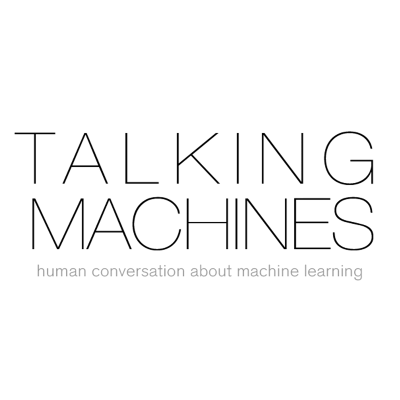
The newest podcasts on this list, with 8 episodes released as of this writing. Every other week, hosts Katherine Gorman and Ryan Adams speak with a guest about their work, and news stories related to machine learning.
The Crowd Favorite
Many consider The Talking Machines the best data podcast around. The information and production quality of this show is top notch, and the hosts very professional. They discuss machine learning, and balance the complicated technicalities with extreme clarity. The podcasts are carefully constructed and delivered to make technical information accessible and usable. Hosts Katherine Gorman and Ryan Adams interview an array of industry names, and also discuss data in relation to different spheres, including economics, interdisciplinary data, and even video games. With its insightful discussions and precise answers, this high quality podcast is hard to top.
The O’Reilly Data Show
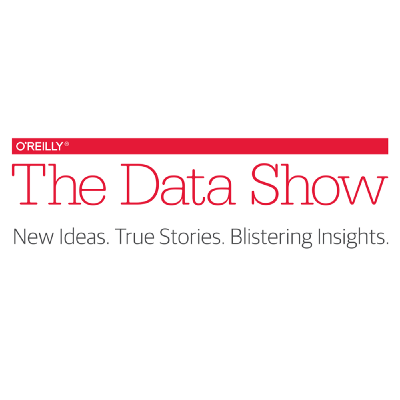
This podcast features Ben Lorica, O’Reilly Media’s Chief Data Scientist speaking with other experts about timely big data and data science topics. It can often get quite technical, but the topics of discussion are always really interesting.
Big Names and Big Business
One of the biggest perks of being a big name like O’Reilly means access to a lot of important and insightful guest speakers. Rather than just talking about big names like Cloudera, Apache Spark and Google data flow technologies, host Ben Lorica gets to talk with them in person. It can be very technical, but the speakers and topics keep each episode lively. Plus, the usefulness of the information makes it well worth the effort. Hearing from these important people adds a level of inspiration and depth to the entire show that is hard for smaller shows to rival.
Linear Digressions

Hosted by Katie Malone and Ben Jaffe of online education startup Udacity, this weekly podcast covers diverse topics in data science and machine learning: teaching specific concepts like Hidden Markov Models and how they apply to real-world problems and datasets. They make complex topics extremely accessible.
Short, Sweet and Silly
Katie Malone and Ben Jaffe of online education startup Udacity host this upbeat and accessible series on data science and machine learning. This podcast may not be ultra professional, but the hosts are very entertaining and informative. Through their discussions (which are often goofy) listeners get a peek into very specific concepts. They often discuss realworld problems and examples average folks may see in daily life (example: how can computers learn to tell jokes?). Each episode is relatively short, running between 820 minutes, making it easy to tune in.
Partially Derivative
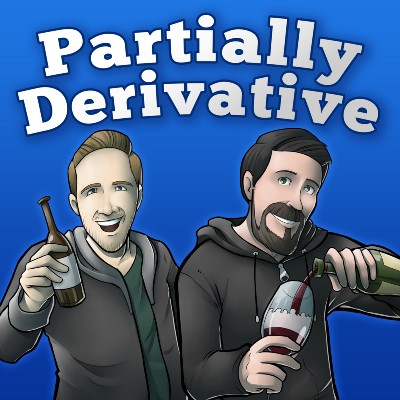
Each week, hosts Chris Albon and Jonathon Morgan, both experienced technologists and data scientists, talk about the latest news in data science over drinks. Listening to Partially Derivative is a great way to keep up on the latest data news.
Drunk Yet Informative
Hosts Chris Albon and Jonathon Morgan make data both fun and inspiring. From sports to art to space to “Can Killer Robots Marry Their Cousins?” this podcast has worked its way into peoples’ hearts around the globe. Oh, and they spend the entire episode drinking, making it particularly fun and easy to listen to. Plus, Partially Derivative’s production quality is comparatively high, with a clear focus on making their podcasts entertaining. They speak openly about cultural, social and any other kind of topic, and many listeners find this series to be particularly inspiring and relatable to life in general, rather than just in the lab.
Data Stories
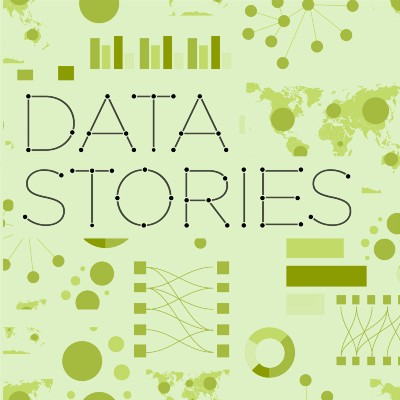
Data Stories is a little more focused on data visualization than data science, but there is often some interesting overlap between the topics. Every other week, Enrico Bertini and Moritz Stefaner cover diverse topics in data with their guests. Recent episodes about smart cities and Nicholas Felton’s annual reports are particularly interesting.
Storytelling Through Data (and other more artsy topics)
For those that believe “data is beautiful,” this may be of great interest. Rather than focusing only on science, hosts Enrico Bertini and Moritz Stefaner discuss data visualization and storytelling. Featuring interviews, projects, and plenty of images on their website, Data Stories can be a bit more philosophical than other podcasts. For example, in one episode they discuss an outside project called “Dear Data.” This project involved “two women who switched continents get to know each other through the data they draw and send across the pond.” The show is both informative and a lively break from other highly technical, science heavy series. Some interesting sample topics include visualizing your Google search history, discussions on data art, and bridging academia and industry.
Learning Machines 101
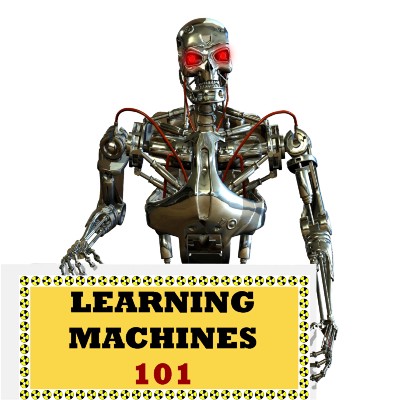
Billing itself as “A Gentle Introduction to Artificial Intelligence and Machine Learning”, this podcast can still get quite technical and complex, covering topics like: “How to Reason About Uncertain Events using Fuzzy Set Theory and Fuzzy Measure Theory” and “How to Represent Knowledge using Logical Rules”.
Academic and Educational
The self termed “gentle introduction to Artificial Intelligence and Machine Learning” is very technical and has plenty of depth to offer. It can feel a bit like a narrated science textbook, allowing for a lot of information with a touch of storytelling. The well established Dr. Richard M.Golden uses each episode to address one topic at length. Luckily, Dr. Golden focuses specifically on including both beginners and those working on a higher level. Whether you’re a hobbyist,student, or scientist, you can come out of these podcasts with a real and deep level of technical knowledge.
Some more podcasts:
Unusual Angles
Data Skeptic takes a different take on how we review data—thanks to some healthy skepticism, listeners come out with unusual information and knowledge. The show alternates between interviews with industry experts, and miniepisodes wherein the host explains data science tidbits to his nondata scientist wife. The tone of this show is simultaneously intellectual and a bit offbeat. It’s fun, and easier to follow than highly technical podcasts. If you need a series with nice production quality and clear, friendly radiovoices, this may be the one.
IBM Analytics Insights
HighLevel and Highly Specific
This series is not everyone’s cup of tea. It can be very technical and, as the speakers are often big names with big products, they may speak about their own projects often. Still, for thosewho work in the fields of data, this podcast tackles some very specific topics, like zone architecture and telematics, but also more “hot” topics like big data myths and trends.
Obsessive Compulsive Data Quality Radio
Highly Technical, Highly Informative
What exactly is data? Metadata? International quality data? Big data? If data is your poison, this will be work and play simultaneously. This podcast is the audio accompaniment to ocdqblog.com, and is proud to be vendorneutral. It’s good for data nerds, tickling several different topics and featuring several special guests and relatively easy to follow discussions. The series’ topics will be useful to business types, who want to utilize data in their own work. Topics often include data governance, master data management and business intelligence.
What’s The Point?
Politics, Economics, Society
Polling aggregation website FiveThirtyEight is behind the podcast What’s The Point? The series is incredibly deep and the discussions extremely insightful—possibly because they focus on topics like politics and how data is changing business, including its impact on workers’ understanding of their role in the workplace. Host Jody Avirgan does a fabulous job of really engaging with interviewees, making discussions thought provoking instead of one sided lectures.
A radio podcast hosted by Stephen J. Dubner and Steven Levitt who tell engaging stories to explore the “hidden side of everything”. Their work may not technically fit into “Data science” category but it is certainly data driven in the sense that one can learn how to use data to answer questions!
All things Hadoop , iTunes
This podcast main focus is on Hadoop MapReduce, a programming model and software framework for writing applications that rapidly process vast amounts of data in parallel on large clusters of compute nodes.
Not So Standard Deviation – a podcast by R. Peng from Simply Statistics
Making Sense of Big Data, Machine Learning, and Deep Learning
Artificial Intelligence Insight from the ‘Godfather’ of Deep Learning
The History of Machine Learning from the Inside Out
It’s Not What You Say, It’s How You Say It — When Language Meets Big Data


